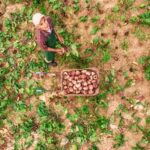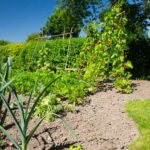Florida is a haven for gardeners, with its warm climate and rich soil providing the perfect conditions for growing a variety of vegetables. However, along with the ideal environment comes a range of bugs and pests that can wreak havoc on your vegetable garden. In this article, we will explore the different types of Florida bugs that pose a threat to vegetable gardens, as well as how to identify, prevent, and control them.
From aphids to caterpillars, Florida is home to a wide array of garden pests that can damage your precious vegetables. In this region, it’s crucial for gardeners to be familiar with the various types of bugs found in Florida in order to effectively protect their crops. Whether you’re a seasoned gardener or just starting out, understanding these common pests is essential for maintaining a thriving vegetable garden.
In the following sections, we will delve into the identification and characteristics of these common garden pests, including details on their appearance, behavior, and typical habitats. We will also discuss the damage they can cause to vegetable gardens, as well as provide valuable insights into preventive measures and control methods.
Additionally, we will explore natural and organic pest control solutions that are safe for both your plants and the environment. By implementing integrated pest management techniques tailored to Florida gardens, you can ensure that your vegetable garden remains healthy and pest-free.
Types of Bugs Found in Florida
Florida is home to a wide variety of bugs that can wreak havoc on vegetable gardens. Understanding the types of bugs found in Florida is essential for effectively managing and protecting your garden. Here are some common types of bugs that you may encounter in your Florida vegetable garden:
- Aphids: These small, pear-shaped insects can be green, black, brown, or pink and are commonly found on the undersides of leaves. They feed by piercing plant tissue and sucking out the sap, which can cause wilting and discoloration.
- Caterpillars: Various species of caterpillars in Florida can damage vegetable plants by chewing on leaves, fruits, and stems. Some common ones include armyworms, cutworms, hornworms, and cabbage loopers.
- Whiteflies: These tiny white insects with waxy wings can quickly multiply and infest vegetable plants. They suck out plant juices and secrete honeydew, which can lead to sooty mold growth.
Identification of these pests is crucial for implementing effective control measures. It’s important to regularly inspect your garden for signs of bug infestations and take action promptly to prevent widespread damage.
In addition to the aforementioned pests, Florida gardens may also be susceptible to other destructive insects such as thrips, spider mites, beetles, and various types of worms. By familiarizing yourself with the characteristics and behaviors of these pests, you can better protect your vegetable garden from potential harm.
Identification and Characteristics of Common Garden Pests
Florida is home to a wide variety of bugs that can wreak havoc on vegetable gardens. Identifying these common garden pests is crucial in order to effectively manage and control their populations. By understanding their characteristics and habits, gardeners can take proactive steps to protect their vegetables from damage.
Common Garden Pests in Florida
Some of the most common insects that are known to damage vegetable gardens in Florida include aphids, whiteflies, caterpillars, and squash bugs. These pests can rapidly multiply and infest garden plants, causing significant harm if left unchecked. By being able to identify these pests, gardeners can implement targeted control measures to minimize their impact.
Characteristics of Common Garden Pests
Each type of pest has its own unique characteristics that distinguish it from others. For example, aphids are small, soft-bodied insects that feed on plant sap and reproduce quickly. Whiteflies are tiny insects with powdery white wings that feed on the undersides of leaves.
Caterpillars are the larvae of butterflies and moths, often recognized by their chewing mouthparts and segmented bodies. Squash bugs are flat, shield-shaped insects that suck juices from plants and leave behind yellow or brown spots on leaves. Understanding these specific characteristics will help gardeners accurately identify the pests in their gardens and implement appropriate control strategies.
Habits of Common Garden Pests
In addition to physical characteristics, understanding the habits of common garden pests is essential for effective management. Some pests may be more active at certain times of day or prefer specific types of plants for feeding and breeding. By observing their behavior patterns, gardeners can anticipate potential outbreaks and take preventative actions to safeguard their vegetable gardens.
Damage Caused by Florida Bugs to Vegetable Gardens
Florida vegetable gardens are often at risk of being damaged by a variety of bugs that are prevalent in the Florida climate. These pests can cause significant harm to the plants in your garden, leading to stunted growth, defoliation, and reduced crop yields if left unchecked. It is important for gardeners in Florida to be aware of the types of bugs that can damage their vegetable gardens and to understand the signs of infestation.
Some common bugs found in Florida that can cause damage to vegetable gardens include:
- Aphids
- Caterpillars
- Whiteflies
- Thrips
- Squash bugs
- Spider mites
These pests can be identified by their physical characteristics and feeding habits, making it easier for gardeners to take appropriate action to control them. Some bugs may feed on the leaves of the plants, while others may attack the fruit or roots, causing different types of damage.
The damage caused by Florida bugs to vegetable gardens can manifest in various ways. Signs of infestation may include yellowing or curling leaves, small holes in leaves and fruit, wilting plants, and a general decline in plant health. In severe cases, certain pests may even transmit diseases from one plant to another, further exacerbating the damage to the garden.
It is crucial for gardeners in Florida to monitor their vegetable gardens regularly for signs of bug infestation and take proactive measures to prevent and control these pests. By understanding the specific types of bugs that can cause harm and the damage they can inflict on vegetable gardens, gardeners can effectively protect their crops and ensure a bountiful harvest.
Prevention and Control Methods for Protecting Vegetable Gardens
When it comes to protecting your Florida vegetable garden from the pesky bugs that can wreak havoc on your plants, prevention and control methods are key. By implementing the right strategies, you can help keep your garden healthy and thriving.
Physical Barriers
One effective way to prevent bugs from damaging your vegetable garden is by using physical barriers. This can include installing row covers or netting to keep insects at bay. These barriers act as a shield, preventing bugs from reaching your precious plants and causing harm.
Cultural Practices
Implementing proper cultural practices in your garden can also help protect your vegetables from bug damage. This includes rotating crops, practicing good sanitation by removing any diseased or damaged plant material, and ensuring proper spacing between plants to improve air circulation. These methods can deter pests and promote a healthier growing environment for your vegetables.
Biological Controls
Another method for controlling Florida bugs that damage vegetable gardens is through biological controls. This involves introducing natural predators of garden pests, such as ladybugs, lacewings, or parasitic wasps. These beneficial insects can help keep pest populations in check by preying on them, providing a natural form of pest control without the use of harmful chemicals.
By incorporating these prevention and control methods into your gardening routine, you can help safeguard your Florida vegetable garden from the destructive impact of insects. Whether it’s using physical barriers, practicing proper cultural techniques, or harnessing the power of biological controls, there are various ways to protect your garden and ensure a bountiful harvest free from florida bugs that damage vegetable gardens.
Natural and Organic Pest Control Solutions
When dealing with Florida bugs that damage vegetable gardens, many gardeners prefer to use natural and organic pest control solutions to protect their crops. There are various options available that do not involve the use of harmful chemicals, which can negatively impact the environment and human health.
One popular natural pest control method is companion planting, where certain plants are grown alongside vegetables to repel insects. For example, planting marigolds near tomato plants can help deter nematodes and other pests. Additionally, using insect-repelling herbs such as basil and mint can also be effective in keeping Florida bugs at bay.
Another effective organic pest control solution is the use of homemade insecticidal soaps or oils. These solutions are made from natural ingredients such as neem oil, garlic, or hot pepper and can be sprayed directly onto plants to deter pests without harming beneficial insects or the environment.
Additionally, introducing biological controls such as beneficial insects or nematodes into the garden can help naturally reduce pest populations. For instance, ladybugs are known to feed on aphids and other soft-bodied pests that commonly plague vegetable gardens in Florida.
| Natural Pest Control Method | Effectiveness |
|---|---|
| Companion Planting | Effective in deterring pests |
| Insecticidal Soaps or Oils | Efficient without harm to beneficial insects |
| Biological Controls (Beneficial Insects/Nematodes) | Naturally reduces pest populations |
Importance of Integrated Pest Management in Florida Gardens
Integrated Pest Management (IPM) is a crucial approach for managing pests in Florida vegetable gardens. This method focuses on preventing and controlling pest infestations while minimizing the impact on the environment. IPM takes into consideration various factors such as the life cycle of pests, weather conditions, and the type of crops being grown. By implementing IPM strategies, gardeners in Florida can effectively manage and reduce the population of harmful insects that damage their vegetable gardens.
In Florida, some of the most common bugs found in vegetable gardens include aphids, caterpillars, whiteflies, and spider mites. These pests can cause significant damage to crops if left uncontrolled. Identifying these bugs is essential for implementing appropriate control measures based on their specific characteristics and behavior.
For instance, aphids are tiny insects that suck sap from plants, causing stunted growth and distorted leaves. On the other hand, caterpillars devour leaves and fruits, leading to extensive damage if not managed timely.
The importance of integrated pest management in Florida gardens cannot be overstated when it comes to protecting vegetable crops from destructive insects. By combining cultural practices such as crop rotation, selecting resistant varieties, biological controls like releasing beneficial insects or using insecticidal soaps and oils, and mechanical controls like handpicking pests or using physical barriers like row covers-gardeners can maintain a healthy balance between pests and beneficial organisms while minimizing chemical inputs.
This approach enables sustainable pest management that preserves the natural ecosystem of Florida gardens while ensuring bountiful harvests free from florida bugs that damage vegetable gardens.
Conclusion
In conclusion, maintaining a healthy and thriving vegetable garden in Florida can be a challenge due to the numerous bugs that can cause damage. However, by familiarizing yourself with the types of pests found in the state, identifying their characteristics, and understanding the damage they can cause, you can take proactive measures to protect your garden.
Whether it’s using natural and organic pest control solutions or implementing integrated pest management techniques, there are various methods available to keep your Florida vegetable garden pests-free.
By being vigilant and regularly inspecting your garden for signs of bug infestations, you can quickly address any potential issues before they escalate. Additionally, implementing preventative measures such as crop rotation, companion planting, and providing proper irrigation and fertilization can help create an environment that is less hospitable to damaging bugs.
Furthermore, it’s important for gardeners in Florida to stay informed about the latest pest control methods and solutions that are specifically tailored to the unique challenges faced in the region. By taking a proactive approach and utilizing effective prevention and control strategies, you can enjoy a bountiful harvest from your vegetable garden while keeping those pesky Florida bugs at bay.
Frequently Asked Questions
What Is Eating My Root Vegetables?
If you’re noticing root vegetables being eaten in your garden, it could be due to pests like carrot rust flies, wireworms, or even rodent damage. To address this issue, consider using row covers and practicing crop rotation.
What Can I Spray on My Vegetable Garden for Bugs?
To deal with bugs in your vegetable garden, you can use organic sprays like neem oil, insecticidal soap, or horticultural oil. These options are effective at controlling a wide range of pests while being safe for your plants and the environment.
Are Aphids and Thrips the Same?
Aphids and thrips are not the same – they are two different types of common garden pests. Aphids are small insects that feed on plant sap and can quickly multiply, while thrips are slender insects that also feed on plant fluids and can cause significant damage to crops if left unchecked.
Both pests require careful management to prevent infestations in your garden.

If you’re looking to get into vegetable gardening, or are just looking for some tips on how to make your current garden better, then you’ve come to the right place! My name is Ethel and I have been gardening for years. In this blog, I’m going to share with you some of my best tips on how to create a successful vegetable garden.





